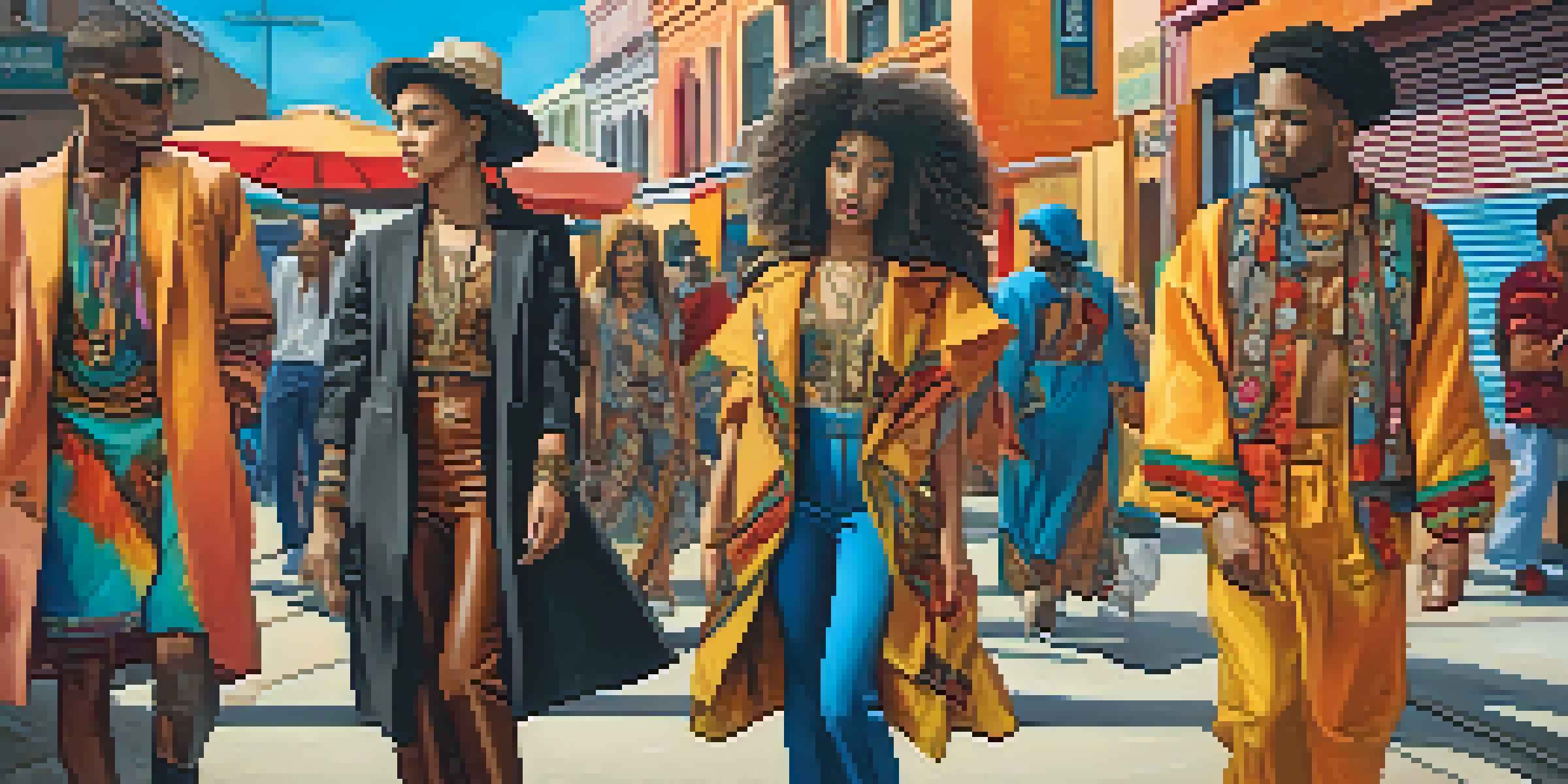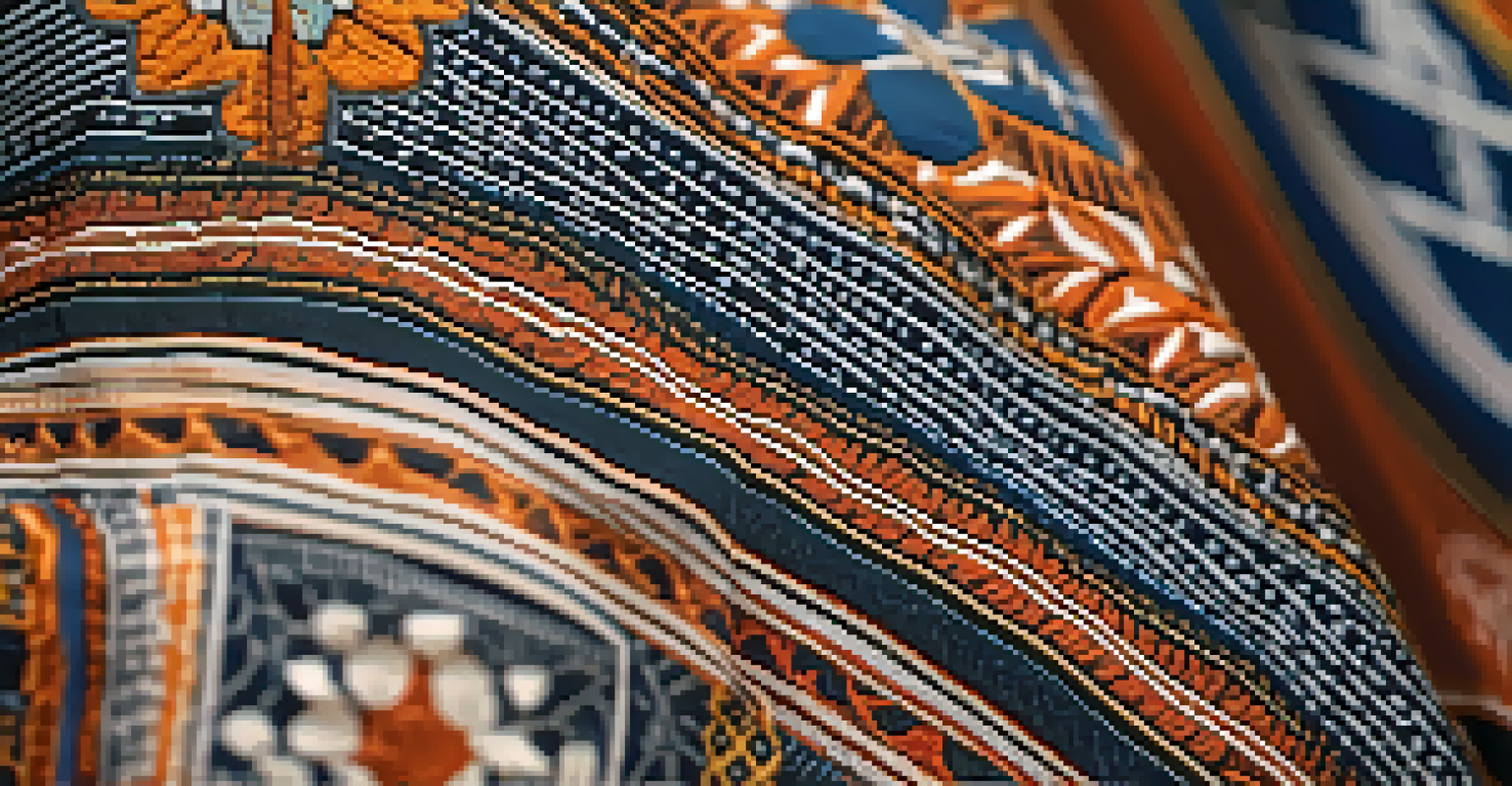Cultural Appropriation in Fashion: Identity and Ethics Explored

Understanding Cultural Appropriation in Fashion
Cultural appropriation in fashion refers to the adoption of elements from one culture by members of another, often without permission. This practice can lead to significant issues, particularly when it comes to marginalized communities whose traditions are exploited for profit. It's important to distinguish between appreciation and appropriation; the former involves respect and understanding, while the latter often lacks acknowledgment of the culture's significance.
Cultural appropriation is the act of taking or using elements of one culture by members of another culture, often without permission or understanding.
Fashion is a powerful medium that influences perceptions and trends. When designers or brands borrow styles or symbols from cultures, they may unintentionally distort their meanings. For example, wearing a Native American headdress as a fashion statement can strip it of its spiritual significance, reducing it to a mere costume. This disconnection can be particularly harmful, as it perpetuates stereotypes and erases the history behind those cultural elements.
Ultimately, understanding cultural appropriation requires a deeper look into the dynamics of power, privilege, and identity. It's not just about clothing; it's about who gets to tell the story and who benefits from it. By recognizing these layers, we can begin to have more meaningful conversations about fashion's role in cultural exchange.
The Fine Line Between Appreciation and Appropriation
Navigating the line between cultural appreciation and appropriation can be tricky, especially in the diverse world of fashion. Appreciation comes from a place of respect, where one acknowledges the origins and significance of cultural elements. For instance, collaborating with artisans from a particular culture to create a collection can be seen as appreciation, while simply copying their designs can fall into appropriation.

One way to foster appreciation is through engagement and dialogue. Designers can learn about the cultural context of the elements they wish to use and involve community members in the creation process. This approach not only honors the original culture but also fosters a sense of collaboration and mutual respect, allowing for a richer and more authentic fashion experience.
Consumer Power for Ethical Practices
Consumers have the ability to influence fashion brands towards ethical practices by supporting those that prioritize cultural sensitivity and authenticity.
However, it's crucial to listen to voices from the communities being represented. When individuals raise concerns about appropriation, it’s important for designers and brands to heed those warnings. Acknowledging criticisms and adjusting practices is essential in promoting ethical fashion that honors diverse identities.
The Impact of Fashion on Cultural Identity
Fashion plays a pivotal role in shaping cultural identity, serving as a means of expression for individuals and communities alike. The way we dress can reflect our heritage, beliefs, and personal stories. When fashion brands appropriate cultural elements, they risk diluting these identities, often reducing rich traditions to mere trends.
Fashion is a form of ugliness so intolerable that we have to alter it every six months.
For example, the rise of streetwear has often drawn inspiration from African American culture, yet many brands fail to recognize the origins of these styles. By not crediting the cultural significance behind streetwear, brands perpetuate a cycle that undermines the very communities that created them. This can create a sense of erasure, where the original voices and stories are overshadowed by commercial interests.
Understanding the impact of fashion on cultural identity is essential for both consumers and creators. By choosing to support brands that respect and honor cultural origins, we can contribute to a fashion landscape that celebrates diversity rather than appropriates it.
Ethical Considerations for Fashion Brands
In today’s socially conscious world, fashion brands are increasingly held accountable for their ethical practices. This includes how they source inspiration for their collections. Ethical considerations go beyond just avoiding cultural appropriation; they also encompass transparency, fair labor practices, and respect for cultural heritage.
Brands can take proactive steps by implementing policies that prioritize cultural sensitivity. This may include consulting with cultural experts or community leaders when designing collections that draw from specific traditions. By doing so, brands not only mitigate the risk of appropriation but also forge meaningful connections with the cultures they wish to celebrate.
Cultural Appropriation vs. Appreciation
Cultural appropriation in fashion often exploits marginalized communities, while appreciation involves respect and collaboration with those cultures.
Moreover, ethical fashion requires ongoing education and self-reflection. Brands must continuously evaluate their practices and be willing to evolve. This commitment to ethical considerations can build trust and loyalty among consumers who are increasingly looking for brands that align with their values.
The Role of Consumers in Curbing Appropriation
Consumers hold significant power in influencing fashion trends and brand practices. By being informed about cultural appropriation, shoppers can make conscious choices about the brands they support. This can lead to a demand for ethical practices in the fashion industry, encouraging brands to be more mindful of their cultural representations.
Supporting brands that prioritize cultural sensitivity and authenticity can create a ripple effect. When consumers choose to purchase from companies that collaborate with and respect the cultures they draw inspiration from, they send a clear message that appropriation is unacceptable. This shift in consumer behavior can drive change, promoting a fashion landscape that values diversity and inclusivity.
Additionally, consumers can use their voices to advocate for change. Engaging in conversations on social media, participating in campaigns, or simply sharing knowledge about cultural appropriation can raise awareness and encourage others to reflect on their fashion choices. Each small action contributes to a larger movement towards ethical fashion practices.
Case Studies: When Fashion Crossed the Line
Several high-profile instances of cultural appropriation in fashion have sparked widespread debate. For example, in 2016, a major fashion brand faced backlash for featuring models in traditional Native American headdresses during a runway show. This incident highlighted not only a lack of understanding but also a blatant disregard for the cultural significance of these items.
Another notable case was when a popular clothing retailer released a collection featuring designs inspired by traditional African textiles without giving credit to the artisans who created them. The outcry from the community emphasized the importance of recognizing and valuing the origins of cultural elements in fashion. As consumers became more vocal, brands began reassessing their practices.
Impact on Cultural Identity
Fashion can dilute cultural identities when brands appropriate elements without acknowledging their significance, often overshadowing the original voices.
These examples serve as critical reminders of the consequences of cultural appropriation. They illustrate the need for greater awareness and sensitivity in the fashion industry, urging designers and brands to approach cultural elements with respect and authenticity.
Towards a More Respectful Fashion Future
The future of fashion hinges on our ability to foster respect and understanding between cultures. By prioritizing collaboration over appropriation, we can create a fashion landscape that celebrates diversity and honors cultural identities. This shift requires commitment from both brands and consumers to engage in thoughtful dialogue and education.
Fashion can be a beautiful expression of creativity and identity when done ethically. Brands can seek inspiration while ensuring that they honor the cultures they draw from. This means actively involving community voices in the design process and being transparent about the sources of inspiration used in collections.

Ultimately, a more respectful fashion future is within reach. By prioritizing ethics, celebrating cultural diversity, and continuing the conversation around appropriation, we can collectively contribute to an industry that uplifts and respects all cultures. Together, we can redefine what it means to be fashionable in a way that honors our shared humanity.